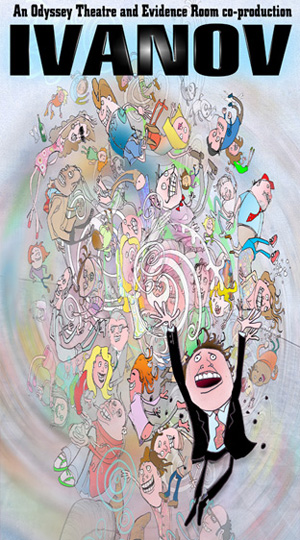A YOUNG MAN’S PLAY
Would-be writers are often given the advice, “Write what you know.” Of the many reasons why writers should write what they know is that it lends authenticity to their creative output. Anton Chekhov’s first full-length play, Ivanov, proves the truth of this dictum. While Ivanov is not exactly an autobiographical play, it does reveal certain parallels between the author’s own life and that of the characters in his drama. It would be tempting to interpret Ivanov purely through the eyes of the title character, but one must keep in mind that Chekhov was a doctor and so there is some of him in Dr. Lvov’s character also.
Anton Chekhov (1860-1904) wrote Ivanov in his late twenties, not long after finishing his medical degree. It is an existential work that reflects the loss of youthful idealism and portrays the tragedy of one who no longer lives in the realm of possibility, of one who is unable to accept the limitations and tedium of adult life. The titular character is a youngish man, perhaps the same age as Chekhov when he was writing the play. He has been married for five years and has already stopped loving his wife, Anna. She is in ill-health and has been diagnosed with tuberculosis by the young Dr. Lvov. That is not the least of her problems, however. Having converted from Judaism to the Russian Orthodox religion, she has been disowned by her parents. Consequently, she never received a dowry and so she and her husband live in debt.
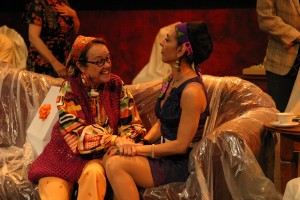 Divided into four acts, Ivanov gives a fairly comprehensive portrait of its principal character. First, one gains a strong impression of Ivanov’s character: he is intelligent, sensitive and somewhat introverted, but constantly plagued by the idiocy and neediness of those with whom he lives. Second, one discovers Ivanov’s refuge from domesticity in the quirky company of his neighbors, the Lebedevs, and their lovely, naïve daughter Sasha. Third, one witnesses the depths of his malaise and the concerns of friends and family. Finally, one sees Ivanov’s inability to reverse the downward trajectory of his life. Looked solely from Ivanov’s perspective, Chekhov’s play is incredibly tragic, though the introduction of other characters adds a welcome comic dimension.
Divided into four acts, Ivanov gives a fairly comprehensive portrait of its principal character. First, one gains a strong impression of Ivanov’s character: he is intelligent, sensitive and somewhat introverted, but constantly plagued by the idiocy and neediness of those with whom he lives. Second, one discovers Ivanov’s refuge from domesticity in the quirky company of his neighbors, the Lebedevs, and their lovely, naïve daughter Sasha. Third, one witnesses the depths of his malaise and the concerns of friends and family. Finally, one sees Ivanov’s inability to reverse the downward trajectory of his life. Looked solely from Ivanov’s perspective, Chekhov’s play is incredibly tragic, though the introduction of other characters adds a welcome comic dimension.
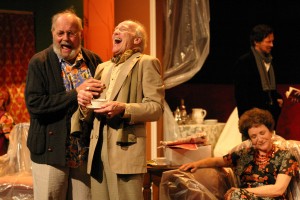 The Odyssey Theatre Ensemble, joined by Evidence Room, gives a markedly comic interpretation of Chekhov’s play. There are undoubtedly many funny characters and episodes in Ivanov: Kosykh the card player (perfectly played by Jay Harik); Count Shabelsky (Tom Fitzpatrick), Ivanov’s gregarious and dependent uncle, whose wicked laugh warms up the audience; the gooseberry jam of Zinaida Lebedev (Eileen T’Kaye), which is served to everyone and consumed by no one; and four adults bawling their eyes out in a fit of melodramatic excess.
The Odyssey Theatre Ensemble, joined by Evidence Room, gives a markedly comic interpretation of Chekhov’s play. There are undoubtedly many funny characters and episodes in Ivanov: Kosykh the card player (perfectly played by Jay Harik); Count Shabelsky (Tom Fitzpatrick), Ivanov’s gregarious and dependent uncle, whose wicked laugh warms up the audience; the gooseberry jam of Zinaida Lebedev (Eileen T’Kaye), which is served to everyone and consumed by no one; and four adults bawling their eyes out in a fit of melodramatic excess.
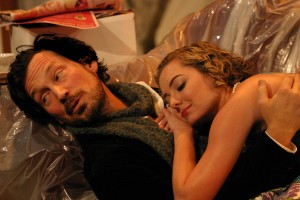 As if to forestall criticism about his interpretation of Ivanov, the director of the Odyssey Theatre/Evidence Room co-production, Bart DeLorenzo, writes in the program notes, “everyone has his/her own idea about whether these unique pieces of theater that Chekhov wrote are funny or sad, sweet or sour, and the precise degree to which the different flavors should mix.” While that may be true, DeLorenzo should be prepared to back up two quite important changes made to the play, both of which lessen the play’s tragic aspect.
As if to forestall criticism about his interpretation of Ivanov, the director of the Odyssey Theatre/Evidence Room co-production, Bart DeLorenzo, writes in the program notes, “everyone has his/her own idea about whether these unique pieces of theater that Chekhov wrote are funny or sad, sweet or sour, and the precise degree to which the different flavors should mix.” While that may be true, DeLorenzo should be prepared to back up two quite important changes made to the play, both of which lessen the play’s tragic aspect.
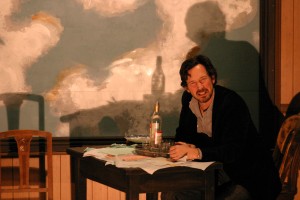 First is the smoothing over of Chekhov’s anti-Semitism. Sure, Paul Schmidt’s translation, used in the present production, cannot completely gloss over this, referring to Ivanov’s wife Anna simply as the “Jew.” But this all becomes rather ironic in Act Two when Anna’s Jewishness is juxtaposed with the stinginess of Zinaida Lebedev. In the more recent translation of Laurence Senelick, Ivanov calls his wife a “kike bitch,” a far more egregious insult than “Jew.” To use this phrase would surely shock a politically correct Los Angeles audience, but it would have been more faithful to Chekhov’s own milieu and better reveal Ivanov’s complete lack of love for his wife.
First is the smoothing over of Chekhov’s anti-Semitism. Sure, Paul Schmidt’s translation, used in the present production, cannot completely gloss over this, referring to Ivanov’s wife Anna simply as the “Jew.” But this all becomes rather ironic in Act Two when Anna’s Jewishness is juxtaposed with the stinginess of Zinaida Lebedev. In the more recent translation of Laurence Senelick, Ivanov calls his wife a “kike bitch,” a far more egregious insult than “Jew.” To use this phrase would surely shock a politically correct Los Angeles audience, but it would have been more faithful to Chekhov’s own milieu and better reveal Ivanov’s complete lack of love for his wife.
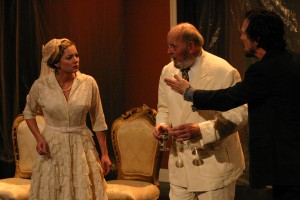 SPOILER ALERT: The other change to Chekhov’s play concerns the manner of Ivanov’s death. Whereas Chekhov has Ivanov run offstage and shoot himself, in the Odyssey Theatre production Ivanov’s death appears to be more an accident, since others onstage wrestle him unsuccessfully for the gun. Ivanov’s death is still the finale, but it looks less like a tragic suicide than a tragic accident that could have been avoided.
SPOILER ALERT: The other change to Chekhov’s play concerns the manner of Ivanov’s death. Whereas Chekhov has Ivanov run offstage and shoot himself, in the Odyssey Theatre production Ivanov’s death appears to be more an accident, since others onstage wrestle him unsuccessfully for the gun. Ivanov’s death is still the finale, but it looks less like a tragic suicide than a tragic accident that could have been avoided.
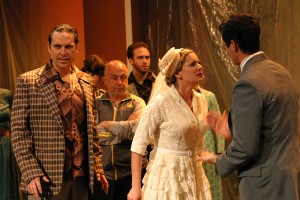 The milking of Ivanov for all of its comic potential makes for a rather unsatisfactory viewing experience. The laughs are great, but they’re not the whole play. Barry Del Sherman, in the title role, reveals his character’s motives well in Acts One, Two and Four. He is brooding, melancholy and unhappy and really looks the part. In Act Three, however, when he should show us the existential anguish Ivanov is struggling to deal with, all we get is a weak, sniveling cry baby. When Ivanov’s scheming estate manager, Misha (Christian Leffler), enters his study, Ivanov’s exasperation leads him to finally tell Misha to pack up his things and leave for good, something he had talked about doing earlier in the play. Yet, instead of voicing it as a command, Del Sherman makes it sound more like a momentary temper tantrum that will pass.
The milking of Ivanov for all of its comic potential makes for a rather unsatisfactory viewing experience. The laughs are great, but they’re not the whole play. Barry Del Sherman, in the title role, reveals his character’s motives well in Acts One, Two and Four. He is brooding, melancholy and unhappy and really looks the part. In Act Three, however, when he should show us the existential anguish Ivanov is struggling to deal with, all we get is a weak, sniveling cry baby. When Ivanov’s scheming estate manager, Misha (Christian Leffler), enters his study, Ivanov’s exasperation leads him to finally tell Misha to pack up his things and leave for good, something he had talked about doing earlier in the play. Yet, instead of voicing it as a command, Del Sherman makes it sound more like a momentary temper tantrum that will pass.
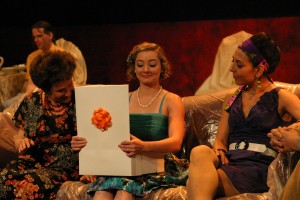 As portrayed at The Odyssey Theatre, Ivanov is more of a buffoon than a tragic hero. He is buoyed by an excellent ensemble cast and a well-staged production, but this is not enough to carry the idiosyncratic interpretation of Chekhov’s play. We know that Chekhov himself had been engaged to a Jew, but unlike the Ivanov of his imagination, Chekhov had the strength of character to break it off. Chekhov, too, suffered from tuberculosis, as Anna did. And Chekhov’s financial woes were similar to Ivanov’s. Chekhov likely did not identify completely with Ivanov, despite the similarities. He must have identified somewhat with Dr. Lvov, the pedantically principled young doctor who treats Anna. Fleshing out the portrait of Chekhov’s own generation are the dull young men at the Lebedevs. Keeping this in mind provides the interpretive key to the play. Ivanov is essentially about young men, their ideals and the loss of their ideals when faced with adversity.
As portrayed at The Odyssey Theatre, Ivanov is more of a buffoon than a tragic hero. He is buoyed by an excellent ensemble cast and a well-staged production, but this is not enough to carry the idiosyncratic interpretation of Chekhov’s play. We know that Chekhov himself had been engaged to a Jew, but unlike the Ivanov of his imagination, Chekhov had the strength of character to break it off. Chekhov, too, suffered from tuberculosis, as Anna did. And Chekhov’s financial woes were similar to Ivanov’s. Chekhov likely did not identify completely with Ivanov, despite the similarities. He must have identified somewhat with Dr. Lvov, the pedantically principled young doctor who treats Anna. Fleshing out the portrait of Chekhov’s own generation are the dull young men at the Lebedevs. Keeping this in mind provides the interpretive key to the play. Ivanov is essentially about young men, their ideals and the loss of their ideals when faced with adversity.
By reinterpreting Ivanov and, thereby, seeking to expand its appeal, this production loses sight of Chekhov’s original and created a play that is both inconsistent in its subject matter and a failure in terms of dramatic impact. It is funny and entertaining, with some uproarious moments, but nothing more.
photos by Enci
Ivanov
Odyssey Theatre Ensemble with Evidence Room in Los Angeles
scheduled to end on June 3
for tickets, visit http://www.odysseytheatre.com
